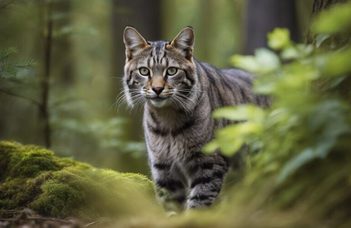Domestic cats are a serious threat to wild cats
Hungarian cat owners may know the principles of responsible cat keeping, but do not practice them

Everyone with a nature-loving attitude in Hungary received the news with happiness when it was announced that in 2024 the European wildcat (Felis silvestris) was voted to be “Mammal of the Year” in the country. This elusive, strictly protected, still less known Felid species has been fully or nearly extinct in big parts of Europe.
Hungary is a country with a relevant wildcat population that mainly lives in habitats with unusually high levels of anthropogenic fragmentation and human presence. Among the dangers that threaten wildcats, we can mention traffic accidents, habitat loss and illegal hunting activity. However,
there is an additional negative factor, specific to wildcats: the effect of domesticated cats.
These popular household pets and rodent hunters often roam or even become feral, consequently competing for the resources with wildcats and by hybridizing with them, push the wild species towards genetic deterioration.
In a joint effort, researchers from ELTE (Dr. Péter Pongrácz and Petra Dobos - Department of Ethology); Hungarian University of Agriculture and Life Sciences (Turi Luca, Dr. Gergely Schally and Dr. Zsolt Biró - Department of Wildlife Biology and Management, Institute for Wildlife Management and Nature Conservation); and the Budakeszi Game Park (Burányi Virág) set up a first ever quest, when they surveyed more than 1300 Hungarian respondents (among them almost a thousand cat owners) regarding their knowledge about wildcats and the dangers they face.
The unique aspect of this study, published recently in the prestigious journal Biological Conservation, was that the respondents were also asked about their theoretical knowledge about responsible cat ownership; and about their own cat keeping practices. The research also included a case study of current wildcat occurrence in Hungary as well as the hunting bag data of unowned domesticated cats from nature. Without any effective restrictions against the incursion of free-ranging or unowned domesticated cats to the wildcat habitats, only legal hunting remains a means of control against their negative effect on the remaining wildcat population.
According to the results, game management emphasizes the removal of mesopredators (including cats) where wildcats are less frequent – while free roaming cats are mainly left undisturbed in the forested areas that prioritize large game management, which is unfortunately, also where the largest populations of wildcats live. The situation is complex, as the control methods of free roaming cats in areas with higher wildcat occurrences could pose risk to wildcats, too.
The study highlighted the underestimated threat domestic cats may pose for wildcats in Hungary compared to other anthropogenic factors. Lack of knowledge and ignorance, on the part of Hungarian cat owners, also contributes to the scenario, as domestic cats are still regarded by many as expendable pest controllers, and consequently, are kept without any safety considerations for either the cats or the wildlife.
The study discovered promising signs too, as many cat owners are not only aware of the theory of responsible cat keeping, but they also exercise it in reality as well. However, there is a general tendency even among respondents with higher and wildlife/biology-related education, that although they are aware of how cats should be responsibly kept in theory, they do not follow the same principles in reality.
This “do as I say, not as I do” approach could be
a consequence of today’s tendency to attribute highly humanized status and socio-cognitive capacities to companion animals.
The authors propose a more realistic and profound understanding of the behavior and ecology of both domestic cats and wildcats in order to achieve higher standards of animal welfare and effective conservation for each of them.
Eredeti publikáció: Pongrácz, P., Turi, L., Dobos, P., Burányi, V., Schally, G. & Biró, Z. (2024). Do as I say, not as I do – the paradoxical relationship between actual cat keeping practices and knowledge about wildcat conservation among Hungarian cat owners. Biological Conservation https://doi.org/10.1016/j.biocon.2024.110586

